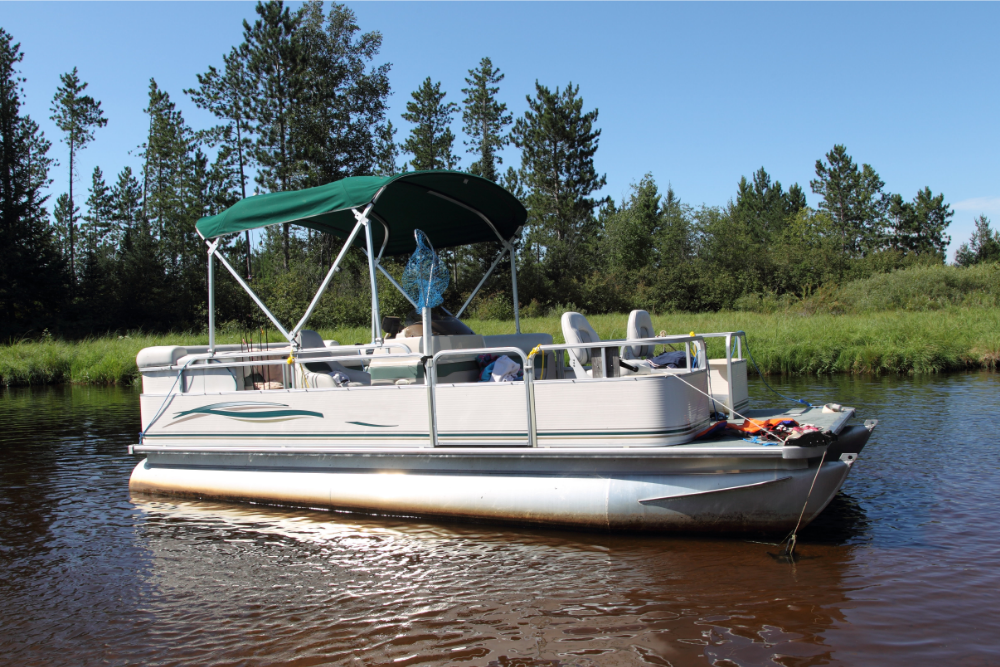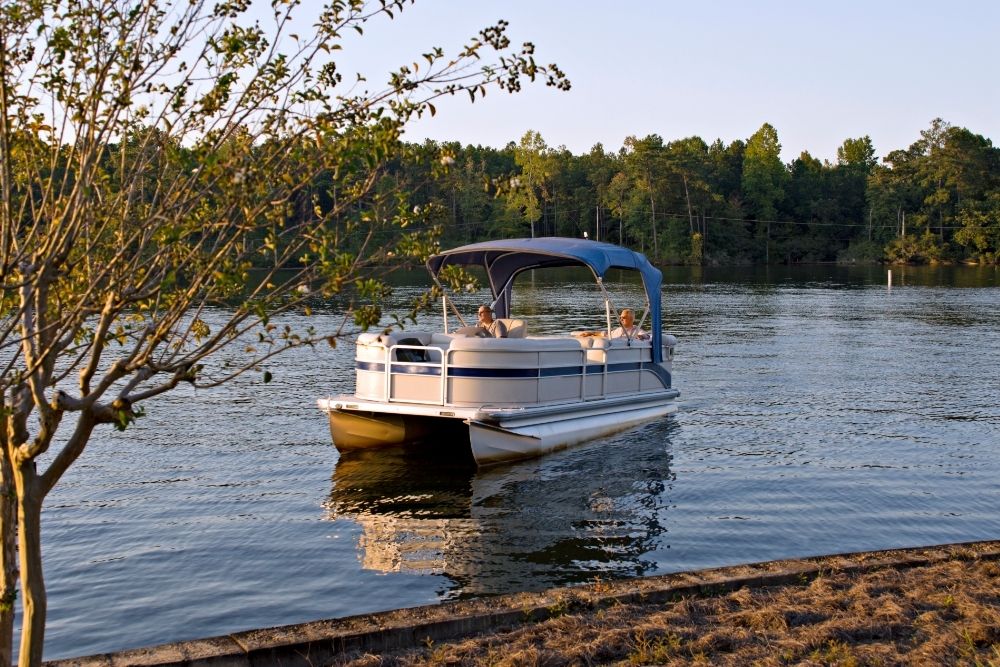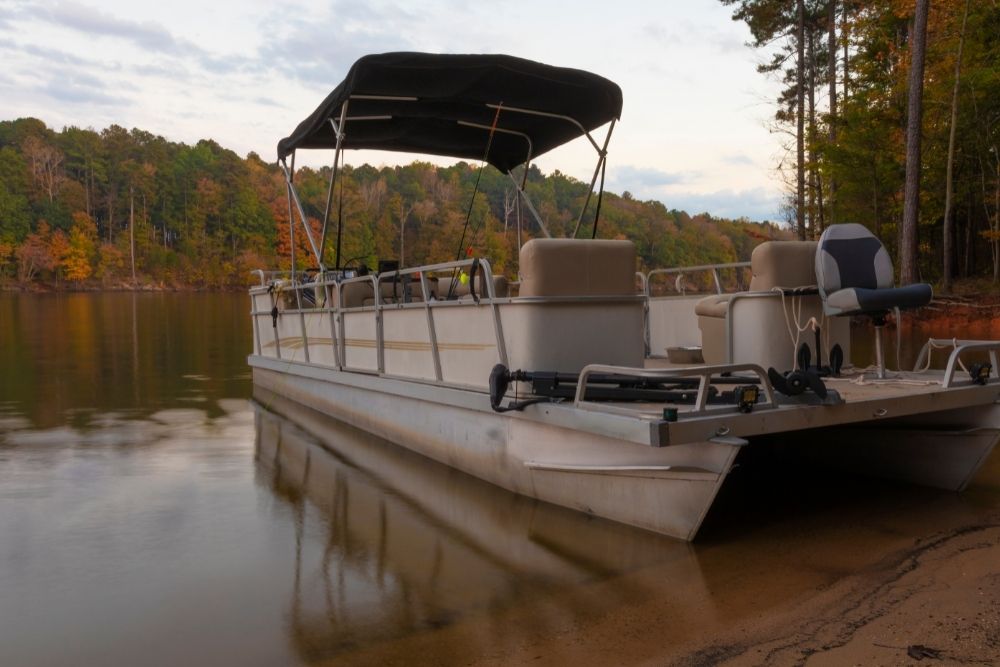Tritoon boats became very popular in the early 2000s when they became associated with luxury. However, Tritoon boats were first introduced to the Market in the 1980s and Pontoon boats have been around since the 1950s.
It used to be that people didn’t really mind whether they bought a tritoon or a pontoon boat, as long as they could get out onto the water. In the mid noughties this changed when Tritoon boats overtook Pontoon boats in terms of popularity and sales really took off.

By the end of the noughties, tritoon boats had approximately 80% of the market share.
But what is a Tritoon boat? How does it differ from a pontoon boat? Which one is better? And how do you know which one is more suited to your needs? We have put together this guide to help you answer those questions, so keep reading to find out more.
What Are The Main Differences Between A Tritoon Boat And A Pontoon Boat?
The most basic difference between tritoon boats and pontoon boats is the number of aluminium tubes that they are made up of. Both kinds of boat are kept afloat by aluminium tubes that are durable and hollow. Pontoons tend to have two aluminium tubes- one on each side.
Tritoons have three aluminium tubes- one either side and one in the middle.
To understand more about these boats, we have explained them in more detail.
More Information About Tritoon Boats
Tritoon boats were introduced in the 1980s because people wanted something larger and sturdier which could carry more passengers, but without compromising on quality and luxury. Sales were steady and tritoon boats were about as popular as pontoon boats, with the market share being split between both kinds of boat.
In the early 2000s Tritoon sales began to overtake pontoon sales, and by the middle of the decade there was a clear difference in popularity.
But why do people prefer Tritoon boats? There are several reasons that they are more appealing to a lot of buyers. Both types of boats perform well on calm water, but Tritoon boats definitely handle rough water better than pontoon boats.
This makes them more versatile and able to be used in more weather conditions.
Tritoon boats also have a larger deck. This means you can carry more passengers and you have space to store more personal items- a day out on the water is easier if you have plenty of space for all of your food, drinks, water sports equipment and towels, or if you can bring more friends along with you.
The larger size of Tritoon boats means that they can handle a bigger, more powerful engine. A high-power performance engine combined with the greater stability of the Tritoon means that it reaches much higher speeds than a pontoon boat.
This means that Tritoons are better for water sports like tubing, wakeboarding, or water skiing.
More information about pontoon boats
Pontoon boats were first sold in the 1950s as a luxurious leisure boat. By the mid 1960s they were very popular, with families and groups of friends using them to get out onto the water.
They were not known for great performance as they weren’t particularly powerful or fast, but they were perfect for socialising. Whether you wanted to go fishing, boating, hold a boat party or dinner party, or take part in water sports, the pontoon would meet your needs.
A range of different models were available, but they all tended to have decadent features like leather seats and were designed for relaxing in style and comfort.
In terms of the engineering and design of a pontoon boat, it is very simple. The deck sits on top of two hollow aluminium tubes to keep it afloat. As well as assisting with buoyancy, they also create thrust and lift when the boat is moving through shallow waters.
The deck is enclosed to keep water out and create a nice relaxing space.
The original pontoon boats tended to have engines that were around 90 horsepower. These days, pontoon boat engines go up to 150 horsepower. There are also other features that have been upgraded as technology has developed. The general build quality and upholstery is also better.
Which Boat Is Best For You?

Now that you know more about tritoon and pontoon boats, the main difference is obvious. The basic structure is the same, but tritoon boats are larger and more stable because they have three aluminium tubes instead of two.
However, there are other differences to consider when it comes to choosing between a tritoon or a pontoon.
Capacity
Having a third aluminium tube makes a significant difference when it comes to the capacity and the weight of tritoon compared to the pontoon. Tritoons can hold more passengers and carry more weight.
If you have a small family or will only go out with a small group of friends then a pontoon would suffice. If you have a large family or would like to use your boat for entertaining, then you might be better off going for a tritoon.
The increased deck size and weight capacity also allows you to take more equipment with you for recreational activities like fishing or water sports.
Power
The performance of the boat is directly related to how powerful the engine is. Larger boats tend to have a more powerful engine, and can often be fitted with an additional trolling motor mechanism to provide even more power when travelling through the water.
Whilst pontoon boats can have higher horsepower engines than they used to, if you want an engine more than 100 horsepower it is recommended to go for a tritoon. The extra size and stability is better equipped to handle the more powerful engine.
If you want your boat to be fast, then you need to balance power and weight. Pontoons are lighter, so can build up more speed if you choose the right engine.
Water Conditions
When you are choosing between a tritoon or a pontoon, you should consider the conditions that you are going to be taking your boat out in. If you will be mostly out on calm and peaceful waters with mild weather conditions then a pontoon will probably be adequate.
If you might be going on on rougher waters or in more adverse weather conditions then you would benefit from the extra stability and strength of the tritoon. The third tube makes a big difference to the sturdiness of the boat in choppy conditions.
Handling The boat
We have established that the third aluminium tube makes Tritoons larger and more stable, and it also makes them heavier. All of these contribute to how the boat handles. Larger boats can be more difficult to maneuver, much like a larger vehicle can be more difficult to park in a tight parking space!
If you aren’t very confident when it comes to docking, steering, or generally handling the boat then you might be better off with a pontoon as it will be smaller.
Storage And Transportation

The size and weight of the boats has an effect on handling, but also on how you transport the boat to the water and where you can store it when it’s not being used. You will need a larger trailer for a tritoon than you would for a pontoon.
You might need a lift mechanism to get the boat onto the trailer, as it might be too heavy to lift yourself even if you have help. You will also need to check how much weight your vehicle can tow.
Tritoons are wider than pontoons and the third aluminium tube needs to be taken into consideration when you are looking at platforms for the boat. This means that you might need to hire a space to store the boat or buy a specialised storage platform.
Budget
As you can imagine, pontoon boats are cheaper than tritoon boats because they are smaller. The exact price of the boat will depend on what model you go for, and the additional features like the quality of the upholstery and the technology used.
Starting prices for tritoons are significantly higher than pontoons.
When you consider your budget, it is not just the initial purchase price that you need to consider. You should also think about the ongoing maintenance of the boat- the larger the boat the more parts and labour etc will be required to maintain it.
You will also need to think about the fuel cost- a heavy tritoon with a powerful engine will use more fuel than a pontoon. Insurance for a larger, more powerful boat is also likely to be more expensive.
If you have a small budget for the purchase of the boat and the ongoing charges, then you might be better suited to a pontoon instead of a tritoon.
Conclusion
Buying a boat is very exciting, but it is an important investment. Make sure you carefully consider your individual needs before deciding whether to get a pontoon or a tritoon.
